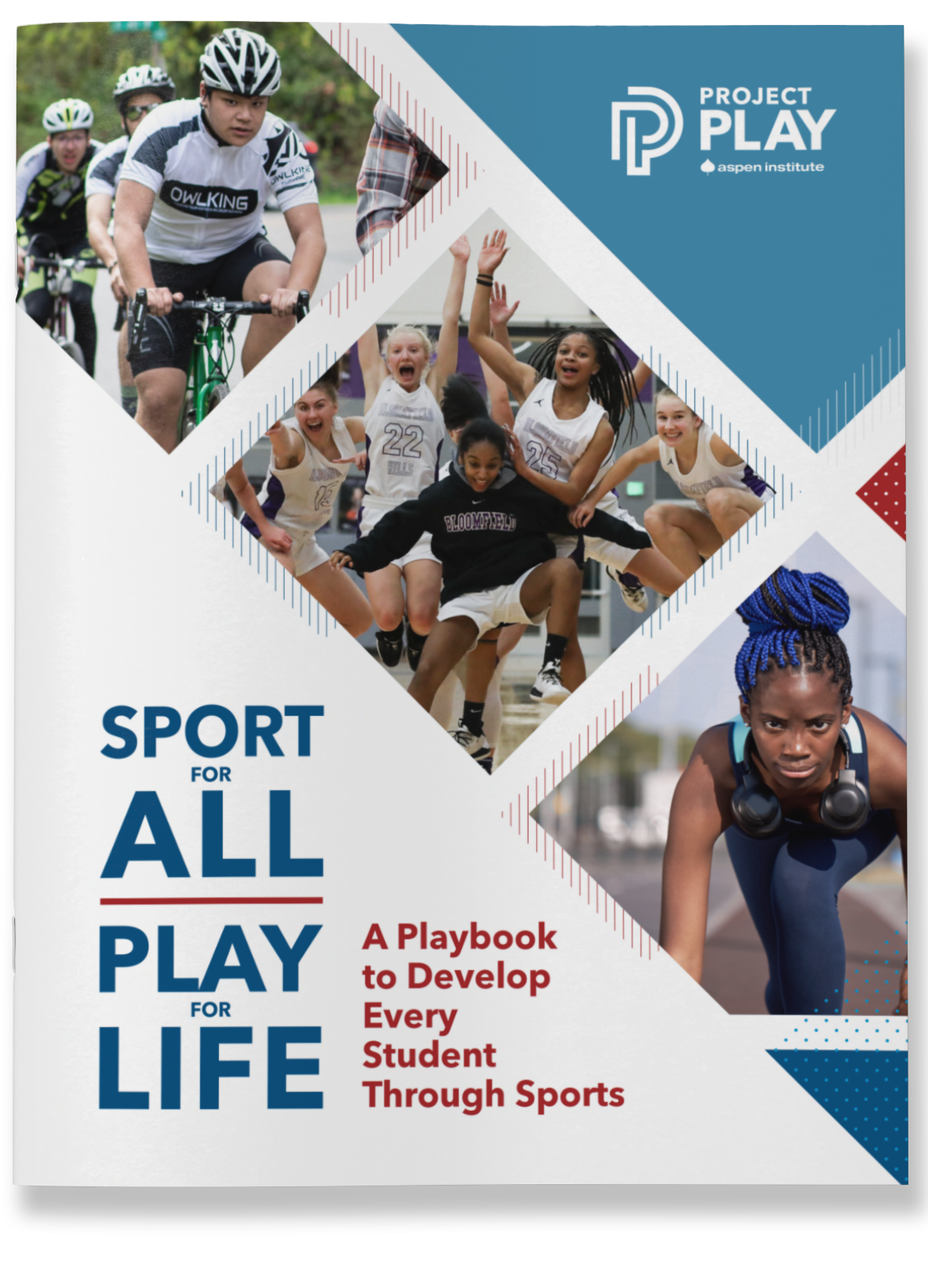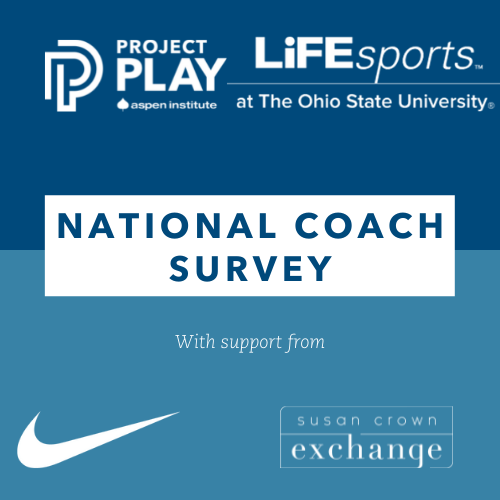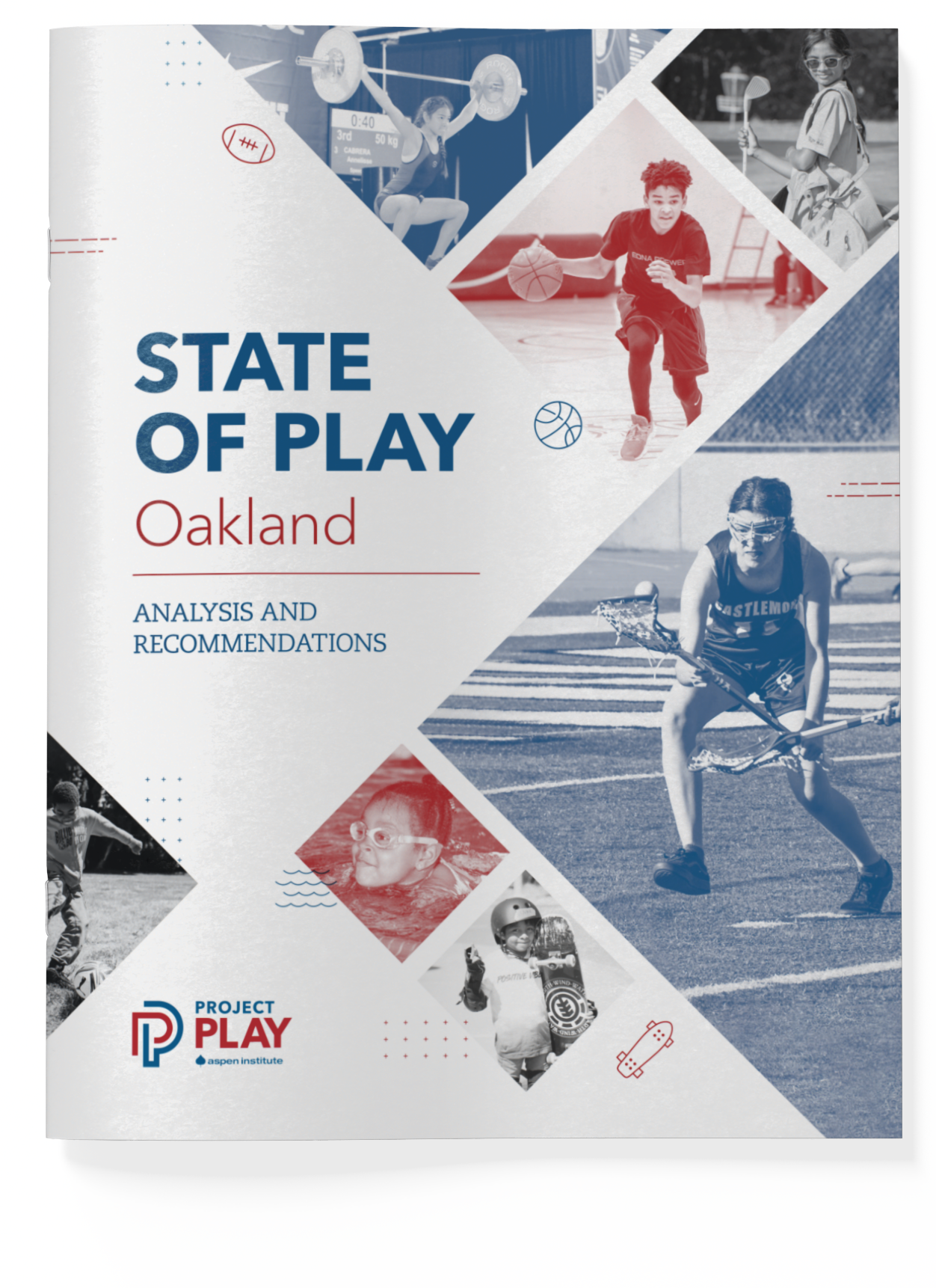2022 Project Play Impact Report
The signature initiative of the Aspen Institute’s Sports & Society Program, Project Play develops, applies, and shares knowledge that builds healthy communities through sports. We identify access and quality gaps in sport activities for youth and help organizations fill them, connecting silos across the sectors that touch the lives of children, inspiring leaders to act meaningfully, and advancing systems-level solutions.
Since Project Play’s inception in 2013, many entities across our network have used our frameworks and ideas to introduce new policies, practices, partnerships, and programs. That network includes: the industry-leading companies and foundations who sit at our Project Play 2024 roundtable; our Project Play Champions group of mostly grassroots sports providers; members of the advisory groups who guide special projects such as our school sports and local State of Play reports (including our Oakland report in partnership with Stephen and Ayesha Curry’s Eat. Learn. Play. Foundation); the more than 20,000 subscribers to our monthly newsletter; and the hundreds of thousands of people annually who consult our website for insights and opportunities to drive progress in their sector or community.
In 2022, our Aspen Institute team made what we hope are important contributions to the field, in collaboration with our partners.
State-Based Funding Unlocked
In January, we took measure of the momentum created by New York state allocating a share of mobile sports betting revenues to youth sports non-profits. New York had become the first state to do, an idea conceptualized by the Aspen Institute and championed by a state assembly member who became aware of gaps in access for low-income kids through Project Play Western New York. The PLAY Sports Coalition, a Project Play Champion, helped mobilize grassroots support for the annual $5 million allocation. Ohio followed with an estimated $12 million annual commitment through sports betting.
Next: PLAYS plans to lobby for similar commitments in other states considering the legalization of sports betting, as well as state budget earmarks. States to watch in 2023 include Minnesota, Georgia, North Carolina, Pennsylvania, Washington, Wisconsin, California and Louisiana.
Inequities Addressed
Key members of the Project Play network are local organizations that the Aspen Institute has worked with to landscape a community’s state of play and prepare leaders to act. In 2022, Project Play Southeast Michigan awarded more than $600,000 to 36 youth sports organizations to promote access to equitable and safe play, and $1 million in one-time grants to 18 organizations. Another $525,000 was awarded to 37 organizations through Project Play Western New York. The University of Washington’s Center for Leadership in Athletics, our partner in State of Play Seattle-King County, continued to shape opportunities through the group that emerged from that report, the King County Play Equity Coalition. A task force report in February commissioned by the state recommended six ways to create more shared-used agreements among schools and community facilities in order to increase youth physical activity.
Next: The task force report is already being used in a variety of ways, including to inform a state-wide grant process to build and improve youth athletic fields to increase equity of access.
Reimagining School Sports
In March, we released Sport for All, Play for Life: A Playbook to Develop Every Student through Sports, the final report in the research phase of our high school sports initiative. The playbook offers eight strategies that school leaders can use to get and keep more students playing sports and enjoying other forms of physical activity, in alignment with the educational mission and documented cognitive, mental and other benefits of physical activity. Most of the strategies were drawn from our two-year, national search for the most innovative school sport programs, with eight winners receiving $160,000 in awards from our project partners (The DICK’S Sporting Goods Foundation, Hospital for Special Surgery, and Adidas/BOKS).
Next: Implementation of the strategies, with the help of the National Federation of State High School Associations and other partners.
National Coaches Survey
In April, we launched our first national survey of youth coaches to better understand who they are, what draws them to coaching, the impact of current training, and other factors that can help lift the quality and quantity of coaches across sports. Supported by Susan Crown Exchange and Project Play 2024 member Nike with research by The Ohio State University LiFEsports Initiative, the survey was distributed by members of the Project Play network and produced more than 10,000 responses from school and community-based coaches.
Next: Analyzing the findings, sharing organization-specific results with participating groups, and helping partners develop and sharpen youth coach training tools and strategies.
First In-Person Project Play Summit Since 2019
In May, our network gathered for the first time since the start of the COVID-19 pandemic. At Audi Field in Washington, D.C., more than 400 leaders came together to assess the impact of the historic disruption in our sport ecosystem, explore community programs that bucked national trends and managed to thrive, and consider what lies ahead with leaders such as U.S. Soccer Federation president Cindy Parlow Cone. The energy in the room was palpable as the Project Play family reconnected and added new members. We announced the latest annual cohort of Project Play Champions, 20 organizations making new, specific, meaningful commitments to action aligned with Project Play strategies.
Also in May, Amazon announced a donation of nearly $1 million to youth sports teams and organizations across Massachusetts, citing Project Play data as the reason the investment was needed. The grants will help expand access and level the playing field for sports and fitness opportunities in underserved neighborhoods and help organizations meet COVID-related budget shortfalls.
Next: Project Play Summit 2023 heads to Colorado Springs, Colorado on May 17-18. Email ppsummit@aspeninstitute.org to sign up for presale alerts.
County Commission Created
Project Play insights contributed to Montgomery County, Maryland establishing a permanent organizing body (Montgomery County Sports Advisory Committee) to advocate for enhanced sports opportunities and identify or address discrepancies found in youth sports.
Next: The commission will be responsible for researching and reporting on factors that affect sports participation in the county; and making recommendations to improve the quality, quantity and variety of sports opportunities and facilities in the county.
State of Play Oakland Report
In August, in partnership with Stephen and Ayesha Curry’s Eat. Learn. Play. Foundation, we released our landscape scan of how well youth in Oakland, California are being served through sports. The report was the culmination of 18 months of research gathering insights from local leaders and youth, who in a survey told us they are very interested in accessing new sports, led by archery (who knew?). The report’s main recommendation is to diversify Oakland’s sports offerings through partnerships by leveraging the city’s existing community school model. State of Play Oakland was our 11th community report and the first initiated by an athlete foundation, a model lauded by Sheila Johnson (part-owner of Washington’s NBA, WNBA and NHL franchises) as a way for athletes to do smarter philanthropy.
Next: The Eat. Learn. Play. Foundation plans to invest millions of dollars against recommendations made in the report and invite other groups to contribute. In 2023, the Aspen Institute will release State of Play Tacoma-Pierce County, with support from the Names Family Foundation in Washington state.
White House strategy
In September, Sports & Society Program executive director Tom Farrey moderated a session at a White House conference where the Biden-Harris Administration released its national strategy for physical activity. The strategy calls for federal government support for the connecting more people to parks, active transportation and land-use policies that promote physical activity, and more opportunities for children to be active both in and out of school, including “robust and tailored physical activity education” programs. State governments are called upon to offer free passes to children and/or families to state parks. Local governments are asked to create more shared-use agreements to make sports facilities accessible to schools. The private sector is asked to invest in building parks and safe sidewalks in underserved neighborhoods.
Next: Educate stakeholders on opportunities of mutual interest.
Global Efforts
In October, Aspen Institute Mexico, through its Project Play initiative, partnered with its Olympic committee on a sport sampling festival for youth. In India, Farrey gave a keynote talk at the 6th World Summit on Ethics & Leadership in Sports, sharing learnings from Project Play. Earlier, in June, Farrey represented the U.S. and gave a presentation at the 27th TAFISA World Congress for leaders from sport-for-all movements on several continents.
Next: Identify additional learnings and activation opportunities with international partners.
Children’s Rights in Sports
In November, the Children’s Bill of Rights in Sports reached a tipping point with the addition of several new supporters; most of the 63 National Governing Bodies of sports affiliated with the U.S. Olympic & Paralympic Committee now endorse the statement. Drafted through Project Play last year, the bill of rights recognizes every child has the right to play sports and, when in in the care of adults, the human rights they are born with should be respected. It’s designed to create a shared cultural understanding about the value of sports participation to children and the minimum conditions under which they should be engaged. More than 140 organizations and 300 athletes, including Curry and Alex Morgan, have endorsed it, along with several other local government entities including the city of Houston.
An academic journal featured the Children’s Bill of Rights in Sports as a key action aligned with the federal government’s National Youth Sports Strategy. U.S. Center for SafeSport referenced Project Play’s coaching and parent resources in its Emotional & Physical Abuse & Misconduct Toolkit.
Next: Embedding these rights in grant-making and policy, and activation efforts at the local level.
Project Play 2024 Member Actions
As the year ends, we take measure of the most important work of Project Play – that of its members. In the highly siloed, disjointed, largely unregulated landscape of youth sports, what’s known in collective impact theory as “mutually reinforcing actions” are essential to driving progress. Each organization at the Project Play 2024 roundtable – a group of two dozen organizations that come mostly from the sports industry -- commits to taking them as a condition of membership. This year, we saw the NBA launch a new Jr. NBA Leagues program to revitalize in-town recreational play, U.S. Tennis Association publish a new American Development Model Junior Playbook to ensure youth opportunities are designed for development, Nike launch Made to Play Neighborhoods in Los Angeles and New York to increase access for girls and minority populations, Hospital for Special Surgery emphasize prevention through free “Move Better, Play Better” resources for schools, and more.
Next: Project Play 2024 members will identify more such actions and explore shared actions as well, with the facilitation and backbone organizational support of the Aspen Institute.
If the pandemic has reminded us of anything, it is the value of sport and physical activity to young people. And that creating the conditions for them to be active is complex work, impacted by events, policies, and trends in broader society that are largely beyond the control of the Project Play network. The economy, the advance of esports and electronic bikes, immigration patterns, declining birth rates, the rise of charter schools that lack athletic facilities … all of it, and so much more, shapes participation rates.
Still, opportunity can be created to build healthy children and communities through sports. And it can be done at scale, by investing in locally developed solutions that work and adjusting the incentives that shape behavior throughout the youth sport ecosystem. The Aspen Institute sees the challenge as a long game.
As we approach Project Play Summit 2023 next spring, our 10th anniversary, please join us as we unpack the legacy of the initiative – and explore the important work that lies ahead for us and our network.








